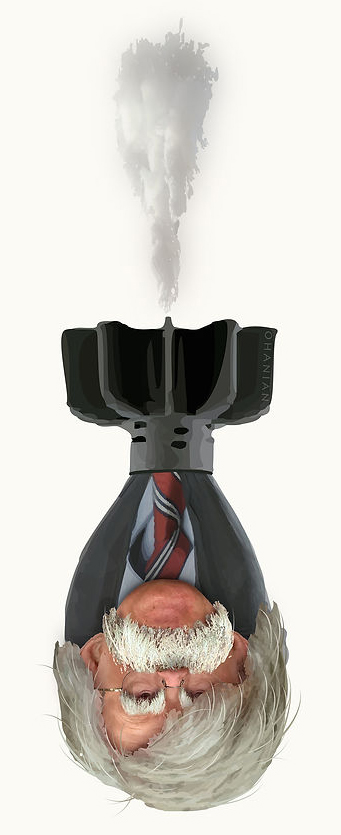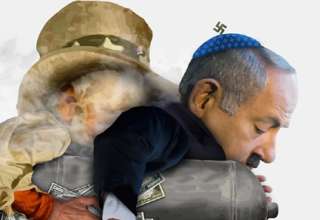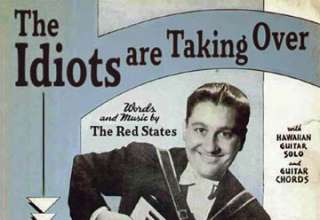By Skip Kaltenheuser
Illustrations: Nancy Ohanian
There’s been much media commentary related to the 20th anniversary of the invasion of Iraq, widely regarded as one of the greatest foreign policy blunders in history.
I’m going to go into the wayback machine for my take on it, below, a piece written in 2007 for the late Gatsby Magazine, one of the international magazines I wrote Letters from Washington columns for. It’s a stab at divining the self-righteous mentality that popped open Pandora’s Box with the March 20th, 2003 invasion of Iraq under the false pretenses of Saddam Hussein harboring weapons of mass destruction and being in league with Al-Qaeda. This was amplified by journalists and politicians who should have known better, some of whom likely did.
As some predicted, WMD’s were never found, something George W. Bush treated with hilarity at a Radio and Television Correspondents Association Dinner a year later.

Pandora’s lid has never closed. The ongoing staggering blows to humanity still cascading from the invasion of Iraq and related post-9/11 cultural mayhem can be examined via recent studies of the Watson Institute at Brown University, including this summary, about the Costs of War which can only shock and awe, and dismay. Don’t just glance at it, spend time with it. Four or five million dead from direct and indirect impacts, by any measure a rambling holocaust. A federal price tag over $8 trillion that reordered our national priorities. The harms inflicted on our soldiers.
Many of the journalists and pundits interpreting the world for us now were children or teens at the time of that invasion. A far larger number, including many contemporary politicians, weren’t even born at the time of the Vietnam War, and many aren’t likely sure of why Dan Ellsberg set the gold standard of moral nobility, as described by Patrick Lawrence. Anyone fortunate to know Dan, even if just through his deeds and words, is elevated by that lucky break.
Some of the discussions on the anniversary of the invasion of Iraq were framed by what lessons have been learned, or as the Carnegie Endowment for International Peace put it in this thoughtful March 7th seminar, Remembering and Misremembering the Iraq War. From the audience, I ventured the comment that we must not have learned much as we’re still trying to prosecute, imprison and destroy whistleblowers who try to enlighten us about the Forever Wars and other government deceptions. In particular, the disgraceful prosecution of journalist/publisher Julian Assange continues at this very moment. A nutshell on the Assange matter is here.
Want more detail on why a foreign journalist is being prosecuted by the US under the 1917 Espionage Act, the first such prosecution of any journalist, and why though never convicted of a crime Assange has been in London in solitary confinement for four years in a Belmarsh Prison dungeon? Here’s a number of excellent speakers at the Belmarsh Tribunal in DC, held at the National Press Club, of which there was not a peep in the mainstream press, including The Washington Post, despite luminaries including Jeremy Corbin, Noam Chomsky and Daniel Ellsberg.
A strong perspective on the invasion comes from Joe Lauria, editor of Consortium News, describing his experience reporting on the run-up to the invasion, the complicity of most of mainstream media and the undermining of those not joining in the cheerleading. Also insightful, Parker Molloy’s account of where some of those cheerleaders are now. One big lesson, if you’re going to screw up big, be sure it’s in tandem with the screw-ups of Washington’s elites.
I’d have bet big that George’s image was deservedly irreparable. I’d have lost. He’s been rehabilitated by Washington elites, first and foremost by Democrats. Go figure. Perhaps some fear raising the bar.
George whiles away his post-presidency with a paintbrush. Subjects include immigrants. Thus far, the number of war refugees and displaced persons after the invasion of Iraq is 38 million. I wonder if George’s canvases ever scream at him.
The Howdy Countdown: A Look Back
Iraq isn’t the only cliff George W. Bush ran America off. He has collapsed the moral high ground America
once stood on in the eyes of the world. Consider German citizen Khaled el-Masri: kidnapped while
vacationing in Macedonia, secretly imprisoned in Afghanistan and then tortured for months. Oops,
wrong guy. He can’t get compensation, can’t even get an apology. Everyone now knows what happened,
but the Bush administration trots out the State Secrets Doctrine, claiming Masri’s day in court
would strike a blow to American security. Bush’s minions on the Supreme Court denied hearing the
case, effectively giving el-Masri no legal recourse in the US. Specific evidence that might reveal real
secrets can be shielded from the public. Any leader worth his salt would say “Here’s your money, we’re
terribly sorry, and the people responsible will be called to account.” Protect the innocent, protect the
weak. Not with Bush in charge.

Masri isn’t alone in such grievances of kidnapping and torture of the innocent. Other draconian tales
are surfacing, as is the woeful reality that the Bush administration has long been talking out both sides
of its mouth about what constitutes torture and what will be refrained from. Moreover, the number of innocents in America’s Cuba, Guantanamo Bay, is anyone’s guess. For them, Bush crushed the concept
of habeas corpus – the right to challenge unlawful detention – the foundation of legal rights for the individual. He claims this bedrock of individual rights would clog the courts.
Watching America’s daily train wreck, observers beyond US borders still drift into shock at the re-election
of our dear leader. They are more understanding of the 2000 election, figuring it loosely defined. They
shouldn’t be. All Americans ever needed to know about Fearless Leader’s potential for rationalizing
mayhem was already known back in 2000 and is reduced to just a single number: 152. That’s the number
of executions Bush presided over as Governor of Texas. A nationwide record in the last century, it was
recently edged by the current Texas governor, Rick Perry. But Perry needed not just Texas bloodlust;
he also needed more years in office to best Bush’s grisly accomplishment.
To top the list of chilling details, lawyers who either had been or were later disbarred or sanctioned,
defended a third of those executed under Bush. In nearly another third of those executed, defence lawyers presented no evidence or merely a single witness during sentencing. Time and again, sleeping
through trial, showing up drunk, lack of preparation – no problem for these guardians of justice. When
some Texas counties sought even a limited public defender system to assist those who could not afford
counsel, Bush vetoed a bill that would do that. Is the Texas horror show that Bush presided over
coming into focus?
Studies indicate that only 5% of those predicted by experts to be violent in the future actually commit
violent acts in prison. But Texas prosecutors frequently used testimony from psychiatrists who never examined the defendants, yet claim with deadly certainty they would commit violent crimes in the future. Texas crime labs have had their fair share of scandals including faked autopsies, false lab tests and bungled DNA. A special prosecutor concluded that one popular expert witness for prosecutors, a doctor, had falsified evidence in at least thirty cases.
Racial bias? Of course. If you’re a minority accused of killing a non-Hispanic white, you’re far more likely
to die. Perhaps this descends from Texas traditions of lynching, and if that’s a cheap shot, so be it. But
there’s never been a groundswell of sympathy for those living on Texas death row, averaging over a
decade of 23 hours a day in a non-airconditioned cell measuring 1.5 x 2.7 meters. Sadism, some might
say, but never a consideration for clemency.

It speaks volumes that Alberto Gonzales was Bush’s pardon attorney for 57 of Bush’s 152 executions.
This practitioner of Gonzo law, you may recall, was recently Bush’s Attorney General of the US. At one
point, the White House floated trial balloons to see if he could be a viable contender to the US Supreme
Court. More recently he clutched the heart of a scandal involving the dismissal of US Attorneys
who were reluctant to engage in unjustifiable prosecutions aimed at helping Republican election
efforts.
Shortly before Gonzo was shown the gate, Bush was pushing legal changes that would allow
Gonzales to expedite state executions across the nation. Alan Berlow, for “The Atlantic” magazine, did
journeyman work examining the briefings Gonzales gave before Texas executions. They reveal Gonzales
to be nothing more than a cog in Bush’s well-oiled state death machine. His abbreviated briefings left
out critical information and were usually presented in a half hour or less on the day of the execution.
The only person spared execution was an alleged serial killer who claimed credit for every murder
he could, and when even the prosecutors said he didn’t kill the person he was sentenced to death for,
Bush had no choice, claiming that in every trial, the state “adequately answered innocence or guilt” in a
“fair trial”.
Leaving that grim hilarity aside, I asked a death penalty appeals expert, Professor David Dow of the
University of Houston Law Center, if Bush fell short on his death penalty review duties. Dow says the only
question Bush asked was whether the condemned had gone through the courts, and that’s “ridiculous.”
There was never a thought to procedural barriers that prevented a fair hearing of the merits of a defendant’s claims. Moreover, says Dow, “The standard for considering clemency goes beyond what a court could examine in standard proceedings. It includes matters that have happened since the time of trial, including what the inmate has done with his life in prison.” There’s no evidence Bush ever considered such matters. He twisted the whole concept of clemency. The exception to this, of course, is the clemency he granted Dick Cheney’s Chief of Staff, ScooterLibby.”
Dow believes innocent people – not just of state of mind or circumstance, but of the actual
crime – were executed under Bush. For example, before Gary Graham was executed, two out of three
eyewitnesses had said he didn’t commit the murder. It’s sobering to consider that a fourth of all convictions shown to be false by DNA testing also involved false confessions. False confessions are not just made by the mentally ill or retarded, and one doesn’t even have to be tortured. It’s terrifying that some legal experts believe the number of innocent people on death row across the country may be as high as six in a hundred.
In 2000, as depressing as it was to know something of Bush’s execution fetish and watch him get the
Republican nomination, it was more dismaying to watch the Democratic Party. When that fellow who
had two out of three eyewitnesses claim he was innocent was executed, Vice President Al Gore – lately
of Nobel Peace Prize fame – took the opportunity to express his support for the death penalty despite
the inevitability of innocent people being executed.

It reminded me of the sinking feeling I had when 1992 presidential primary candidate Bill Clinton, then Governor of Arkansas, demonstrated he was tough on crime by returning to his state for the execution of a man so brain damaged that, at his last meal, he put aside his pecan pie for later.
Just as Bush still cows many opponents by accusing them of being soft on terror, the mere fear of
being accused of being soft on crime was enough to prompt opponents to avert their gaze from the
abomination that Bush rode in on. They didn’t yell that we must at least consider his execution milestone
and with it, the prospect that George W. Bush – this born-again Christian, this compassionate conservative – was morally challenged. It is to their eternal shame that they lacked either the courage or the ability to articulate the obvious. He was reckless with life, caring nothing for justice or mercy – only political expediency – then why would Bush worry about the prospect of a collateral damage of a few hundred thousand innocent Iraqis?
So, now we are all prisoners of Fearless Leader. Every day, we make a mark on our collective cell
wall, knowing that we will get no time off for good behaviour. At least we know how long our sentence
will last. Meanwhile, the dreams of those less lucky – whether in Guantanamo or on a trip to the exotic
lands of extraordinary rendition – have nothing left but to compete with the worst nightmares of Orwell
and Kafka.























